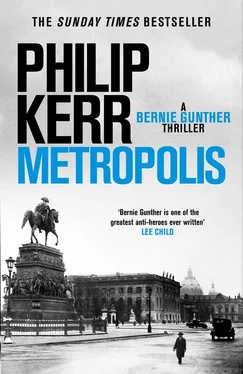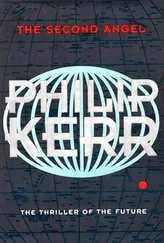Gennat was pouring us each a glass of schnapps from a half-litre he kept in his coat pocket. He raised his glass and waited for Weiss and me to do the same. In his fat pink fingers the glass looked like a crystal thimble.
‘What are we drinking to?’ I asked, thinking that it might be my own early good fortune.
‘We’re not drinking to anything, lad,’ said Gennat. ‘We’ve got another body to go and look at.’
‘Now?’
‘That’s right. Now. Tonight. This minute. And by all accounts we’re all going to need a bit of liquid backbone. Victim looks pretty tasty apparently.’
‘Another girl’s been scalped,’ added Weiss, and rather to my surprise he necked his drink in one.
I swallowed the schnapps, grabbed my hat and coat, and followed them out the door.
In the murder wagon, outside the Praesidium’s main entrance, Weiss asked if I had read all the Silesian Station files.
‘Not yet, sir. I’ve read the files on Mathilde Luz and Helen Strauch. I was just about to read the third case — the attempted murder — when the call came through about the floater in the Spree.’
‘We’re waiting on Hans, are we, Eva?’ Gennat was looking at Frau Künstler, who was busy lighting a cigarette.
‘He said he wouldn’t be long. That he had to fetch some new plates for the camera.’
‘I expect the dead girl will wait,’ said Weiss. ‘They usually do. It’s me who’s in a hurry to get home, not her. Poor thing.’
‘Yes, sir.’
‘Ernst, bring Gunther up to speed with the most recent attack,’ said Weiss. ‘Do you mind listening to this kind of talk, Eva?’
‘No. I don’t mind. I type up the victim reports, don’t I? What, do you think I just forget all that stuff? Sometimes I think this city has more dead bodies than a battlefield. I try and forget but not for long and not long enough. To really forget you need a hobby and I don’t have time for one on account of the fact that I’m always in this damn car.’
‘Sorry, and I’m sorry to ask you to work late again,’ said Weiss.
‘That’s all right. Fortunately for you I need the extra money. Besides, I don’t sleep so well since I started working for you people.’
‘I’m not surprised,’ said Gennat.
‘Oh, it’s nothing to do with the murders and the details of what happened to the victims. That I can deal with. Just about. It’s the man downstairs in the building where I live. He’s a singer in a choral group called the Comedian Harmonists. And when he’s drunk, which seems to be at all hours of the day and night, he sings.’
‘I’ve heard of them,’ said Gennat. ‘They’re famous.’
‘Yes, well, not for much longer,’ said Eva Künstler. ‘One night you’re going to get a telephone call to attend an address in Potsdamer Chaussee, and you’ll find a singer with his throat cut and me standing over him with a razor in my hand.’
‘That’s a good address,’ said Gennat. ‘We’ve never had a murder there. It will make a nice change to go somewhere like that one day. And I’ll certainly make a point of forgetting that we ever had this conversation. Now, I can’t say fairer than that.’
‘Ernst remembers every detail of every murder he’s investigated,’ said Weiss. ‘Isn’t that right, Ernst?’
‘I don’t know. Maybe. If you say so.’
‘That’s one reason why he’s such a good detective. The Big Buddha never forgets. So then. Fill Bernie in on girl number three. Fritz Pabst.’
‘Fritz? She’s got a man’s name?’
‘Believe me,’ said Weiss, ‘the similarities are just beginning.’
‘Fritz Pabst, also known as Louise Pabst, was a transvestite prostitute,’ said Gennat, ‘and a good one, too, which is to say that even in broad daylight it was difficult to tell that she was really a man. The pictures of Fritz dressed as Louise are salutary for anyone who thinks he’s an experienced man of the world. Right down to his Goschenhofer underwear.’
‘Wish I could afford nice stuff like that,’ murmured Frau Künstler.
‘Pabst kept a photo album and was planning to become a singer at the Pan Lounge. By day he worked at Wertheim’s department store, in haberdashery, and by night he frequented the Pan and the Eldorado lounge, not very far from where he was attacked and left for dead. That’s right: left for dead. Because girl number three there survived the attack.
‘Pabst insists he hadn’t picked anyone up and that his attacker came out of a dark doorway and just hit him. As with the previous victims, a blow from a hammer broke his neck. We think that when the killer tried to scalp him, Fritz’s wig came off in his hand and the killer ran for it. The victim stayed alive, however, and gave us a clue, which, so far, we’ve managed to keep out of the newspapers. He doesn’t remember anything about the killer except for the fact that in the immediate seconds before he was attacked, he heard someone whistling a tune we’ve now identified as being from The Sorcerer’s Apprentice , by a French composer called Paul Dukas. He wasn’t sure about the name but he hummed it to me and I whistled it to a musician from the Philharmonie in Bernburger Strasse, who identified it. The only witness — the woman who found him — doesn’t remember a man whistling but she does remember seeing a man washing his hands in a horse trough near Fritz’s unconscious body. A man wearing a soft wide-brimmed hat with lots of longish fair hair on one side, Bohemian style. Like an actor, she said. Fritz Pabst is recovering in hospital but so far he has been unable to remember anything else. And frankly he isn’t likely to; it’s touch-and-go if he’ll ever walk again, poor devil. And certainly not in high heels.’
Hans Gross arrived and, opening the rear door of the murder wagon, proceeded to place a box of camera plates in the back alongside his tripods and arc lamps before climbing in with Frau Künstler. He squeezed the woman’s knee and stole a puff of her cigarette; to my surprise she objected to neither.
‘Sorry to keep you waiting. Sir, I’m going to need some more things from Anschütz. We’re running a bit short.’
‘Investigating murder is an expensive business,’ said Weiss. ‘Especially in Berlin. I’ll sort it out, Hans. Leave it to me.’
The driver — a cop in uniform — started the big engine and we drove off, followed by a squad car.
‘Where are we going?’ asked Gross.
‘Wormser Strasse,’ said Weiss.
‘That’s much further west than the previous victims.’
‘Can I continue?’ said Gennat.
‘We’re all ears,’ said Weiss.
‘Now, at the time I couldn’t figure out exactly why the killer should have felt the need to wash his hands in the trough if he hadn’t scalped his victim. There was no blood to speak of. But walking around the area in daylight I discovered that there were wet-paint signs on the Patent Office on Alte Jakobstrasse, and it occurred to me that perhaps the killer wasn’t washing blood off his hands, but green paint. So we unscrewed the doors, scrutinized them for fingerprints, and found a partial handprint, which of course may or may not belong to the killer. Sadly, it doesn’t match anyone we have on record, and for the moment, we’ve drawn a blank on that one, too.’
‘Now, that was a clever bit of thinking,’ said Weiss. ‘I’m sure I wouldn’t have thought of that. The Big Buddha is very like his ancient namesake, Gunther. Not only is he perfectly self-awakened, he is also endowed with the higher knowledge of many worlds. Learn the nine virtues of detective work from him. Learn them and make them your own.’
‘Fritz Pabst had no boyfriend,’ continued Gennat, ignoring the compliment, ‘no girlfriend, and nothing in the middle, if you know what I mean. So we can’t go blaming it on any poor bastard who loved him. But. And this is interesting. We did find a British pound note next to Fritz’s discarded wig. As if it might have fallen out of the killer’s pocket.’
Читать дальше












